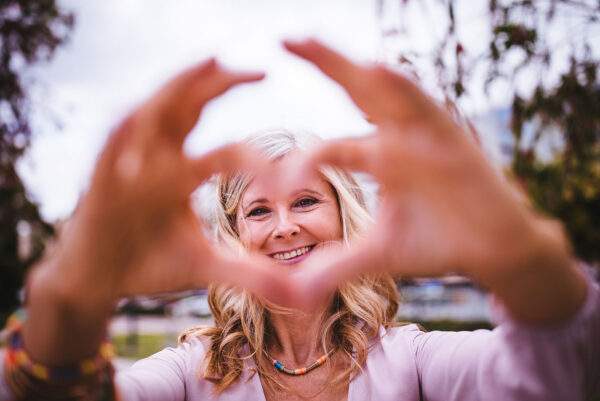
This biweekly column is sponsored by The Mather in Tysons, Virginia, a forward-thinking Life Plan Community for those 62 and better.
November — a month containing both Veterans Day and Thanksgiving — is an ideal time to focus on feeling thankful. Concentrating on feelings of gratitude helps you feel happier and more positive in the short and long term.
“Multiple research studies have examined the benefits of a simple gratitude practice,” says Jennifer Smith, PhD, director of research at Mather Institute. The Institute is the research arm of Mather, a not-for-profit organization with three senior living communities that plans to open The Mather, a Life Plan Community for those 62 and better, in Tysons in 2024. The Institute is an award-winning resource for research and information about wellness, aging, trends in senior living and successful aging service innovations.
“Gratitude can help us feel more connected to others, increase positive emotions, and reduce negative thoughts,” says Dr. Smith. “And emphasizing the positive can create more positivity.”
The Gratitude-Happiness Link
Many studies have linked higher levels of gratitude to more happiness and satisfaction with life; in other words, it seems the more one feels gratitude, the happier and more satisfied one feels in general. One study that earned an Innovative Research on Aging Award from Mather Institute points out that older adults consistently report the highest levels of gratitude, compared to middle-age and younger adults. That link between level of gratitude and overall life satisfaction does not change with age, which means those over age 60 have a “happiness advantage” due to their high levels of gratitude.
The good news is that you can practice gratitude at any stage of life to actually improve your happiness, positivity and life satisfaction. One study showed that a regular habit such as daily journaling can enhance your long-term happiness by more than 10%.
Feelings of gratitude have also been shown to make us more resilient, boost optimism, increase self-esteem and reduce depressive symptoms. Focusing your attention on the positives rather than the negatives — which is what a gratitude practice does — can actually switch your outlook for the long term.
Physical Health Benefits
Feeling grateful also carries some physical benefits. It seems obvious that feeling optimistic and generally positive would impact one’s blood pressure, and research confirms this. A study of people with hypertension who were asked to practice gratitude at least once a week showed a “significant decrease” in their blood pressure. A similar study showed that practicing gratitude can improve quality of sleep.
Give Gratitude a Try
If you want to enjoy the benefits mentioned here, try to focus on feeling grateful at least three times a week, if not daily. Here are some examples of habits you might adopt:
- Gratitude journal: Whether you use a special notebook or scrap paper, take time every day or evening to list five things you feel grateful for. Ideally, you’ll save your lists so you can look back on them over time. Reviewing them will also increase your positive feelings.
- Thank-you notes: Write a note or email to someone who has had a positive impact on your life — whether it was a single action or a lifetime of support. Expressing your gratitude in writing gives you a chance to think more deeply about your thankfulness — and will make the recipient happy!
- Gratitude meditation: Take some quiet time to reflect on what you’re grateful for, then examine the feelings brought up when you identify those items, people or experiences. Focusing on what you value will bring moments of peace and joy.
- Share gratitude: Find a “gratitude buddy” — perhaps your spouse, child or a close friend — and take turns listing a few things you are grateful for. This adds extra depth to gratitude, as you can build off of each other’s comments.
- Take a gratitude walk: Take a stroll and look for positive things — from the walkability of your neighborhood to appealing sights and friendly people.
Whether you’re a natural pessimist or an optimist, try a regular gratitude practice. It will improve your outlook right away, and could result in lifelong benefits.
The Mather, projected to open in Tysons, VA, in 2024 for those 62 and better, is a forward-thinking Life Plan Community that defies expectations of what senior living is supposed to be.
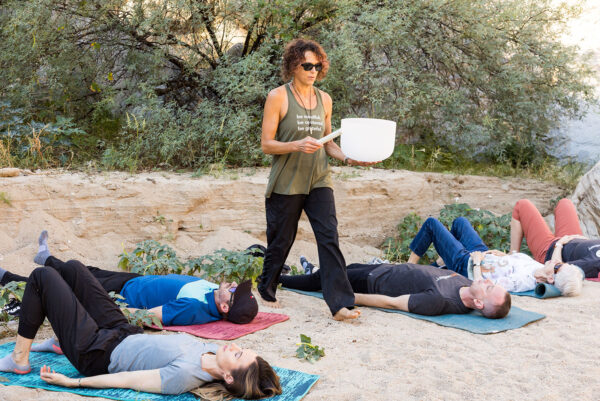
This biweekly column is sponsored by The Mather in Tysons, Virginia, a forward-thinking Life Plan Community for those 62 and better.
How do you Age Well? There are so many avenues for pursuing personal wellness, it can be overwhelming. Yet it’s so fulfilling to try something — whether an exercise class or a new habit — that instantly “rings true” with you.
One option you might not have considered is the growing trend of sound wellness. Sound wellness refers to using audio — including music, acoustic resonance, and/or vibration — to boost our well-being. You might play a specific song to change your mood, take in a crystal singing bowls experience, or use a smartphone app like Endel on the Apple Watch to create a personalized, neuroscience-based playlist of sounds customized to your biofeedback and more, designed to optimize your day. All of these are examples of sound wellness.
Grounded in Science
Science has shown that sound has a profound effect on our physical health, mood, mental health and overall well-being. Much of this has to do with how our brains respond to sound, vibration and rhythm.
Developers and manufacturers are using this science to develop apps, products and programs to harness sound therapies for a variety of uses, including:
- to relieve stress
- to promote creativity or boost productivity
- to trigger rest, recovery or sleep
- to manage pain
Researchers are even studying the effects of sound on cancer cells!
Sounding It Out
Mather is a not-for-profit organization with three senior living communities and plans to open The Mather, a Life Plan Community for those 62 and better, in Tysons in 2024. Over the past year, they’ve incorporated sound wellness into some resident offerings such as workshops on rhythm and percussion. “For Active Aging Week this year, we invited residents and staff in our Life Plan Community in Tucson to try experiences that incorporated sound wellness,” says William Wesley Myers, director of Wellness Strategies for Mather. “We facilitated a nature- and sound-bathing hike in a nearby canyon (see image at top of this article) that incorporated exercise and nature immersion, followed by a guided meditation with a crystal bowl sound-bathing component.” Sound bathing uses tone and vibration to resonate with the body, and may help with stress, fatigue and depression symptoms.
From sound-bathing sessions to smartphone apps, sound wellness and its proven health benefits seem to have a lot to offer.
The Mather, projected to open in Tysons, VA, in 2024 for those 62 and better, is a forward-thinking Life Plan Community that defies expectations of what senior living is supposed to be.

This biweekly column is sponsored by The Mather in Tysons, Virginia, a forward-thinking Life Plan Community for those 62 and better.
Research has shown that older adults who engage with the arts in a group setting — anything from dancing to a poetry group to singing in a choir — enjoy tangible benefits in multiple areas of health. This has to do with feelings of mastery, and with social connection.
“This research, combined with Dr. Gene Cohen’s description of life after 50 as a time of potential and inner growth known as the Creative Age, forms a foundation for using creativity to support personal wellness,” says Caroline Edasis, director of community engagement for Mather. Mather is the organization that’s bringing The Mather, a forward-thinking Life Plan Community for those 62 and better, to Tysons, Virginia, in 2024.
Susan Fine agrees. An artist with a studio and gallery in Washington, D.C., she plans to move to The Mather. She explains that, after a successful career in health care, “I went to Glassell School of Art at the Museum of Fine Art Houston when I was 60. And I so enjoyed the experience! You can be more creative the older you get — child-rearing responsibilities and traditional work may recede, and you open up to other things. There are so many directions you can go in art; I focus on painting and mixed media.”
Midge Scelzo, who is also planning to move to The Mather, has a similar story: “I worked in banking for 25 years, then as CFO for tech startups. In 2009, we moved to Florida and I started a new CFO job… but I realized I wanted to get back to art. I wanted to challenge myself.” She joined a group of artists and started painting. “I’m loving it. It uses a different part of my brain. I’m still that finance person — detail-oriented and organized — but art relaxes me, and I can tune out the world.”
Creativity as Wellness
Mather encourages residents in their existing communities — not just those who are established artists — to try creating new art forms in Open Art Studios. These studios, which position arts engagement as a vehicle for wellness, not just recreation, inviting both lifelong and new artists to explore their own Creative Age in a welcoming group setting.
“While working in diverse media including ceramics and mixed media/painting, participants often realize alongside their peers that they have an untapped expressive ability, a new love for a specific media, or a personal project to pursue,” says Caroline. “One of our master’s-level facilitators, trained in art and psychology, is present to support each individual’s creative journey, and that person helps transform the group into an uplifting community in which residents learn more about each other and themselves.”
Inquiry-Based Art Viewing
Mather also has a signature approach to art appreciation — one that mirrors how contemporary museum practices are evolving. Rather than teaching or encouraging art appreciation with lectures from an expert such as a docent, they focus on inclusive, inquiry-based art-viewing techniques.
“Did you know that the average person spends 17 seconds looking at a work of art in a museum?” asks Caroline. “In our visual literacy programs, we often spend a full hour describing an image, sharing stories conjured by the work of art, or even creating group poems in response to the work. These techniques focus on the interests, experiences, and curiosity of viewers to deliver intellectually stimulating content while challenging us to bring culture down from the pedestal and into our lives.”
“This method is a great way to improve people’s cognition, and their interest and engagement with life,” says Eileen Mandell, who plans to move to The Mather when it opens. Eileen, who is currently the community relations director at 1st Stage theater in Tysons, has been immersed in the world of theater as well as studied and practiced various art media. “I’m looking forward the creative arts programming that The Mather will offer,” she says. “I’m a creative person in general, and I want to act as an art maven there.”
The Mather has already formed relationships with local arts organizations, and plans to offer inquiry-based art experiences for residents on-site in museums, theaters, galleries, and more.
Mather recognizes that creativity is about much more than visual art. They encourage everyone to recognize aging as a time of great creative potential, whether through music, poetry, storytelling, dance and movement, or even gardening — the sky is truly the limit.
The Mather, projected to open in Tysons, VA, in 2024 for those 62 and better, is a forward-thinking Life Plan Community that defies expectations of what senior living is supposed to be.

This biweekly column is sponsored by The Mather in Tysons, Virginia, a forward-thinking Life Plan Community for those 62 and better.
Whether you engage in a weekly game of bridge with friends, or compete in tournaments to earn masterpoints, playing the game pays off “in spades” when it comes to maintaining and even improving cognitive health.
“It’s a great way to maintain memory processing skills, as well as challenging your basic logic skills. It’s a lot of fun!” says Eleanor Linde, who regularly plays five time a week. Eleanor lives in McLean and is looking forward to moving to The Mather, a Life Plan Community that is coming to Tysons in 2024. “Bridge is a wonderful way to connect with people” says Eleanor. “I’m delighted that a group of future Mather neighbors has already met once.”
Van and Fran Hitch are also avid bridge players who are moving to The Mather. When Fran retired, the couple decided to take bridge lessons together, and got hooked. “I thought this was just a game I was learning,” said Van. “But I quickly found out it involves a great deal of strategy and communication with your partner.”
Research shows that those who play bridge regularly can reap a handful of valuable health benefits, regardless of their skill level.
A Brain Workout
It’s been proven that regularly playing cards and board games helps us retain mental acuity in later life, improves performance on cognitive tests and even protects against the risk of Alzheimer’s disease.
Bridge in particular is a rigorous mental workout, requiring concentration, problem solving and multitasking (including, but not limited to, memorizing cards played and continually analyzing mathematical odds while noting verbal and non-verbal clues from other players).
“I’ve read that playing bridge is one of just a handful of pastimes that can increase your brain power — and we definitely are challenged,” says Fran. “We both like to work out and keep our bodies in shape. Bridge does that for our brains.”
A Social Exercise
Of course, regular bridge players reap the benefits of social interaction, which is also good for brain health, as well as mood.
“The social part is just as important to us as playing the game,” says Fran. “Starting with our very first lessons, we’ve met some really nice people. Some have become very close friends.”
A Boost for the Immune System
One study found strong evidence that playing bridge protects physical health, because it stimulates the area in the brain responsible for the immune system.
“Bridge is good for you. We look forward to playing with our future neighbors at The Mather,” says Fran.
The Mather, projected to open in Tysons, VA, in 2024 for those 62 and better, is a forward-thinking Life Plan Community that defies expectations of what senior living is supposed to be.

This biweekly column is sponsored by The Mather in Tysons, Virginia, a forward-thinking Life Plan Community for those 62 and better.
When you’re having a good day, or even a good moment, do you savor it?
If so, you are actively boosting your overall happiness and even your health. Savoring is defined as the ability to notice positive experiences and engage in thoughts and behaviors that enhance your enjoyment of the experience.
“We don’t always take the time to notice good things that are happening in our lives. Savoring is a way to make the most of positive experiences,” says Jennifer Smith, PhD, director of research at Mather Institute, an award-winning resource for research and information about wellness, aging and trends in senior living. The Institute is the research arm of Mather, the organization that is bringing The Mather, a forward-thinking Life Plan Community for those 62 and better, to Tysons, Virginia.
Dr. Smith has conducted several studies on savoring, and one involved surveying 267 older adults to measure their savoring, life satisfaction and self-reported health. “We found that the relationship between self-reported health and satisfaction with life was different for people with high and low savoring abilities,” she says.
“When savoring ability was low, people reported lower life satisfaction when their health was poor. However, those with a high ability to savor reported significantly greater satisfaction with life — even when they were in poor health. This suggests that the ability to savor positive experiences can help people respond more resiliently to health challenges.”
The good news is that you can practice savoring and strengthen your ability to pay attention to positive experiences, appreciate enjoyable or meaningful experiences and build positive feelings. Savoring does not necessarily have to occur during an event — it can occur when you anticipate an upcoming positive event or imagine a future happiness. Savoring can also take place when you reminisce about a past positive event, or when you recall how you felt during a happy experience.
Dr. Smith’s research showed that older adults who practiced simple five-minute savoring exercises twice a day for six or seven days reported higher resilience, greater happiness and lower depression compared to those who didn’t fully complete the exercise. There were three steps to the savoring exercise:
1. Think about a positive experience
2. Pay attention to positive feelings that arise
3. Take a moment to appreciate the experience
Find Your Happy Place
Residents of Life Plan Communities may not have to work as hard at savoring exercises: research shows that they have higher levels of happiness and life satisfaction than other people. The findings, based on surveys of 4,100+ residents in 122 Life Plan Communities around the US, are from the Age Well Study conducted by Mather Institute.
Released in 2021, the Age Well Study findings include:
- Those who are satisfied with their daily life and leisure activities report greater overall happiness.
- The personality traits of extroversion and agreeableness are both linked to greater happiness and life satisfaction.
- People are happier and more satisfied when they have a greater sense of community belonging.
- Approximately 92% of respondents were highly satisfied with the place where they live.
The Mather, projected to open in Tysons, VA, in 2024 for those 62 and better, is a forward-thinking Life Plan Community that defies expectations of what senior living is supposed to be.

This biweekly column is sponsored by The Mather in Tysons, Virginia, a forward-thinking Life Plan Community for those 62 and better.
Swimming laps is a terrific, low-impact exercise option and a pleasant way to work out… But there’s another reason to consider jumping in a pool: a growing body of research is finding that swimming in particular holds multiple, unique benefits for our brain health.
“These recent studies are fascinating, and the findings are increasingly positive,” says William Wesley Myers, Assistant Vice President of Wellness Strategies at Mather. Mather is the owner operator of The Mather, a Life Plan Community that is coming to Tysons in 2024. “We’re learning that science shows that swimming regularly can improve one’s cognitive function as well as short- and long-term memory, and may help repair damage caused by stress.”
Cynthia Sitcov of Arlington is a lifelong swimmer who is looking forward to moving to The Mather and enjoying the on-site indoor pool there. “I swim five days a week — it’s addictive for me,” she says. “If I go a day or two without swimming, my body craves it.”
A Proven Pool of Benefits
One study of older adults found that those who swam had improved attention and mental speed compared to a group that didn’t swim. And swimming can offer a cognitive boost to younger people: a study of younger athletes (including swimmers and land-based athletes) found that 20 minutes of moderate-intensity breaststroke swimming improved cognitive function. Children have been found to learn better after swimming than after anaerobic exercise or a resting activity like coloring.
“It’s exciting to see this scientific data supporting the benefits of such an accessible activity,” says William. “Swimming and aquatics classes are gentle on joints and don’t require great mobility. Anyone can use aquatic exercise to improve muscle endurance as well as core strength and endurance, while burning an estimated 400 to 500 calories in an hour of exercise.”
More specifically, research shows that aquatic exercise can help with the following:
- Strengthen the cardiovascular and respiratory systems
- Improve bone density — particularly in post-menopausal women
- Boost pulmonary function and blood pressure
- Increase muscular strength and stamina
- Improve range of motion
- Increase circulation
- Reduce body fat and tone the body
Japanese researchers found that women age 60 to 75 who participated in regular aquatic exercise for 12 weeks demonstrated more strength, flexibility and agility, and had better total cholesterol levels, than a control group.
Swimming and aquatic exercise can also have a powerful effect on mood. Research has also shown that exercising in water is a natural mood-booster, enhancing self-esteem while reducing stress, anxiety and depression.
“Swimming for me is like meditation in motion; I count my laps and don’t think about anything else,” says Cynthia. “Even when I’m having a bad day, I’ll feel better after I swim. I never get out of the pool feeling lousy; I feel like my body was just plugged into an energy source.”
It can also be a social experience: “I’ve been swimming with the same people for 25 years,” says Cynthia. “We’ve solved the world’s problems, talking 10 minutes at a time in the locker room.”
All of the above seem like great reasons for everyone to give swimming and aquatic exercise a try. In other words, everyone in the pool!
The Mather, projected to open in Tysons, VA, in 2024 for those 62 and better, is a forward-thinking Life Plan Community that defies expectations of what senior living is supposed to be. The community’s comprehensive fitness center will include an indoor swimming pool.
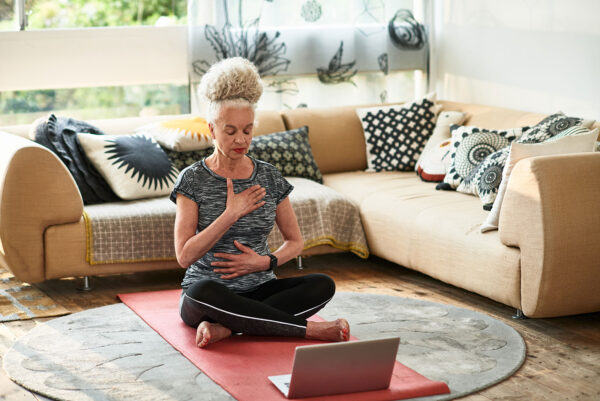
This biweekly column is sponsored by The Mather in Tysons, Virginia, a forward-thinking Life Plan Community for those 62 and better.
If you’re looking for an easy way to improve your physical health and mood, just breathe. The practice of breathwork, or the intentional manipulation of your breathing has been gaining attention thanks to the widespread popularity of yoga and meditation. However, researchers have been studying the benefits of breathwork for years.
“Breathing is not new — it’s the most essential thing we do for our bodies — but breathwork is a new approach to wellness,” says William Wesley Myers, assistant vice president of wellness strategies for Mather. Mather is the owner operator of The Mather, a Life Plan Community that is coming to Tysons in 2024.
Renee West knows the power of breathwork. “Breathwork is extremely important in yoga. They call it the intelligence of the body,” she says. When Renee, who plans to move into The Mather, retired from her corporate sales career, she pursued certification as a yoga instructor. Today, with an additional teaching certificate in Yin Yoga, she leads classes in a local yoga studio and has her own practice.
“Breathwork has many health benefits,” Renee explains. “You can use it to increase or decrease your energy, to calm your mind and to help you focus, among many things. There are so many techniques.”
Breathwork Benefits
Physical benefits from deep breathing are often instantaneous. There is a direct relationship between breath rate, mood and systems that activate our fight-or-flight or rest-and-restore responses, which directly affect heart rate, respiration and digestion. Deep, mindful breathing carries benefits to these systems and more.
Emotional Health: One study showed that manipulating the breath can cause up to a 40% variance in emotions. Evoke joy by breathing and exhaling slowly and deeply through the nose. Other research shows breathwork can help to treat anxiety, PTSD and severe depression, even in those who don’t respond well to antidepressants.
Blood Pressure: A regular practice of slow, deep breathing is an effective way to reduce blood pressure.
Stamina: An Italian study found that the lungs of mountain-climbers who practiced slow breathing an hour a day for two years maximized oxygen better, allowing the climbers to forego supplemental oxygen needed by others to summit Mount Everest.
Focus: Breath-focused yoga can sharpen participants’ attention spans and focus by changing brain chemistry.
Pain Management: Multiple studies have shown that slow, deep breathing can reduce perception of chronic pain or help people cope with discomfort. Breathwork can be especially effective with back pain.
Longevity: Research has shown that breathwork improves metabolism and reduces inflammation — both of which contribute to longer life.
“People can all benefit from doing a little breathwork,” says Renee. “You can do some simple breathing exercises sitting on the edge of a chair with your feet flat on the ground. Even five minutes of breathwork offers benefits!”
The Mather, projected to open in Tysons, VA, in 2024 for those 62 and better, is a forward-thinking Life Plan Community that defies expectations of what senior living is supposed to be. The community is located in the center of a vibrant urban location just two blocks from the Metro and within walking distance to restaurants, retail, and parks.
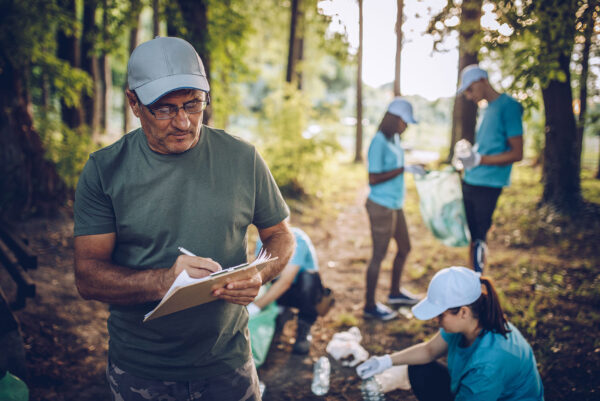
This biweekly column is sponsored by The Mather in Tysons, Virginia, a forward-thinking Life Plan Community for those 62 and better.
Volunteer work is a wonderful use of your time. Doing something worthwhile for others offers a wealth of benefits to your own well-being, from keeping you mentally and socially active to strengthening your sense of purpose and satisfaction with life.
“I find volunteer work to be very satisfying,” says Paul Korkemaz, a part-time consultant and devoted volunteer who is planning to move with his wife to The Mather, a Life Plan Community in Tysons, when it opens in 2024.
Paul devotes time to three charitable pursuits when he’s not working.
“I like the sense that I’m actually making a difference,” he says. He has been teaching English as a Second Language for over 25 years at a Catholic church in Vienna; he does fundraising for an organization called Education & Opportunities for Lebanon, which serves underprivileged children throughout Lebanon; and he is a member and president of the Society of St. Vincent de Paul’s Arlington Diocese Council.
Interestingly, some volunteer activities may be better than others when it comes to life satisfaction. New research from Mather Institute looks at different formal and informal volunteer activities and finds that many older adults could increase their life satisfaction by choosing more formal activities like Paul. Formal activities are generally done for an organization, as opposed to informal activities like helping out a neighbor or friend.
Mather Institute is the research arm of Mather, the parent organization of The Mather. The Institute is an award-winning resource for research and information about wellness, aging, trends in senior living and successful aging service innovations.
“In our study on ‘the value of volunteering,’ we found that not all opportunities offer the same psychological benefits,” says study author Nicole Lehpamer, PhD, senior research associate at Mather Institute. The study reveals that volunteer activities most likely to increase your life satisfaction include the following:
- Fundraising
- Mentoring youth or tutoring and teaching
- Collecting, preparing, serving or distributing food
- General labor (like cleaning up a public park)
“The things I’m engaged in with these organizations are not just talk,” says Paul. “I can see the understanding on someone’s face as they learn English; I can know the difference we’re making in the lives of children in Lebanon who I’ll never meet. That is what’s satisfying.”
Want to find a volunteer opportunity that will maximize your life satisfaction? Start by looking at local community groups, schools or places of worship for formal volunteer opportunities like those listed above.
The Mather, projected to open in Tysons, VA, in 2024 for those 62 and better, is a forward-thinking Life Plan Community that defies expectations of what senior living is supposed to be. The community is located in the center of a vibrant urban location just two blocks from the Metro and within walking distance to restaurants, retail, and parks.
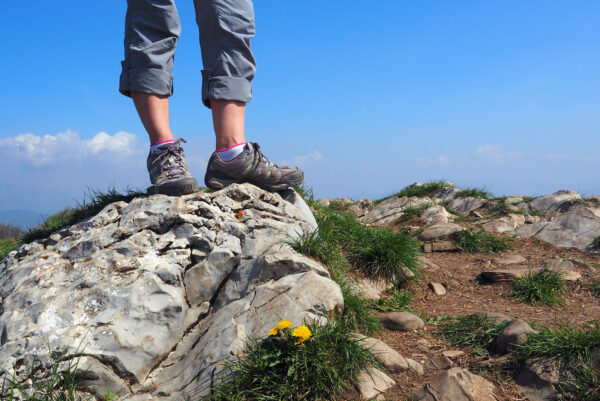
This biweekly column is sponsored by The Mather in Tysons, Virginia, a forward-thinking Life Plan Community for those 62 and better.
Why work out in a fitness center when you can get a great cardio workout enjoying fresh air and great views?
Of all the opportunities for outdoor exercise around NOVA, hiking may be the most versatile — and one of the most beneficial for your body, brain and mood. It can even impart a sense of awe. “I find hiking very inspiring,” says Cindy Morrow. “We are surrounded by beauty!”
Cindy and her husband Gene have enjoyed hiking together for the duration of their 49-year marriage. When they moved to the D.C. area from the Ozarks in Missouri in 2014, she says, “We were happy to see there are mountains, rivers and amazing hiking opportunities.”
The Morrows are part of a small hiking group of future residents of The Mather, a Life Plan Community that will open in Tysons in 2024. The group gets together every month or two for a day hike, most recently in Sky Meadows State Park in Virginia. “Hiking is more fun with a group,” says Cindy. “For one thing, it makes us put something on the calendar and go. The Mather group allows us to make friends with so many interesting people!”
A Walking Workout
Hiking — even on flat land — will exercise muscles including your quadriceps, hamstrings, lower leg and hip muscles. Hiking on an unpaved, slightly uneven trail will also engage the core muscles in your torso. Like any other cardio workout, hiking is good for your cardiorespiratory fitness, as well as sleep quality and weight loss. (A brisk hike can burn up to 550 calories per hour.) And because walking is a weight-bearing exercise, it also helps build bone density.
Step Up to a Better Mood
Walking is good for your brain, as well as your body. Through simple exercise, your body begins to release proteins and chemicals which can help lower stress levels and have positive benefits on memory.
Another benefit of hiking is the release of endorphins in your brain. Endorphins are chemicals released in the brain that minimize any physical discomfort, blocking the feeling of pain and causing a natural “feel good” rush.
Hit the Trail, Not the Treadmill
Research shows that taking your exercise outdoors compared to working out in a gym offers unique benefits for physical, cognitive and emotional health:
- Multiple studies have shown that regular exposure to “green areas” can cause our bodies to relax and let go of stress, as well as ease anxiety. One study found that people in nature had slower heart rates and lower levels of the stress hormone cortisol than those who spent time in the city.
- Walking or exercising outdoors has also been proven to strengthen short-term memory. Simply spending time in nature is also associated with improved concentration and attention spans.
- Studies have linked time spent in nature with lower levels of inflammation, reduced hypertension and even a stronger immune system.
Research found that people who run outside exert more energy than treadmill runners; they also enjoy it more and therefore will run for longer periods of time.
Want to try a hike? The Morrows recommend Catoctin Mountain Park, Great Falls Park, “anywhere along the Shenandoah,” and Rock Creek Park, among many others.
The Mather, projected to open in Tysons, VA, in 2024 for those 62 and better, is a forward-thinking Life Plan Community that defies expectations of what senior living is supposed to be. With an enviable urban neighborhood location, the community offers easy access to the area’s parks and hiking trails.
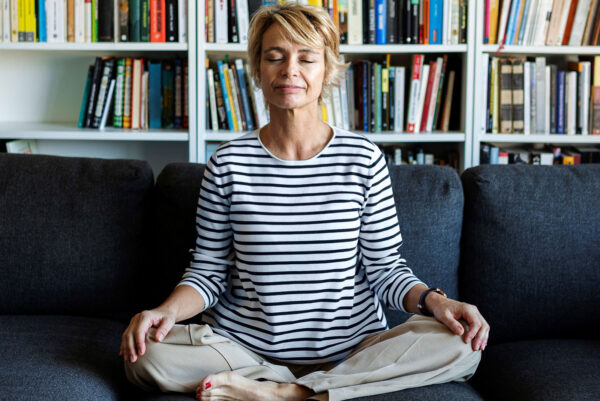
This biweekly column is sponsored by The Mather in Tysons, Virginia, a forward-thinking Life Plan Community for those 62 and better.
When it comes to doing something good for your cognitive health, skip the “brain games” and try meditation. Regular meditation has proven benefits for your brain, which can sharpen your memory, boost your mood and even make you more compassionate.
Build Your Brain
A major health benefit of regular meditation is that it reduces stress, which prevents a lot of wear and tear on our bodies, as well as prevents damage to our brains. More importantly, studies show that meditation can actually grow, or increase the volume of, areas of the brain responsible for:
- complex cognitive processes including planning, goal setting, decision making, attention and short-term memory
- positive mood
- improving awareness of body, gut feeling and empathy
- long-term memory
- paying attention (which is crucial to improving memory)
When you meditate, you are training your attention by tuning out the information overload and jumbled thoughts we live with constantly — and better attention means a sharper memory. Preliminary research seems to strengthen this theory, suggesting that mindfulness meditation may enhance certain brain functions, including working memory.
Types of Meditation
Meditation is simple and takes as little as a few minutes a day. But remember — if you want to enjoy the brain benefits, you’ll need to meditate regularly and ideally that means every day.
Here are a few types of meditation to consider:
Mindfulness sitting meditation is the most common form of meditation. Sit comfortably with your back, neck and head straight but not stiff. Concentrate on your breathing and the sensations it creates. When your mind wanders or you become distracted, gently return your focus to your breath. Try this for just five minutes at first, gradually increasing the time.
Visualization meditation involves mental visualization of an image, which is usually meaningful or religious. While you meditate (as above), you try to mentally visualize your chosen image in as much detail as possible. As you do so, you may also reflect on the meaning of your image.
Walking meditation is similar to sitting meditation. Slowly and comfortably walk, focusing your attention on each step, the movement of your body and the feel of each foot on the ground. When your mind wanders, gently bring it back to the movement of walking.
Loving-kindness meditation focuses on practicing compassion. As you practice cultivating feelings of loving kindness, gradually move your focus from feeling this toward yourself, then to loved ones and then to people who are less close to you.
Look for a local meditation class, or purchase audio recordings of guided meditations. Once you’ve mastered the basics of your chosen type of meditation, it will become a matter of practicing — and enjoying the benefits that come with it.
The Mather, projected to open in Tysons, VA, in 2024 for those 62 and better, is a forward-thinking Life Plan Community that defies expectations of what senior living is supposed to be. The community’s biophilic design is planned to include a live herb wall, spa lounge with Himalayan sea salt wall, and much more — plus meditation and mindfulness programs for residents to enjoy.

